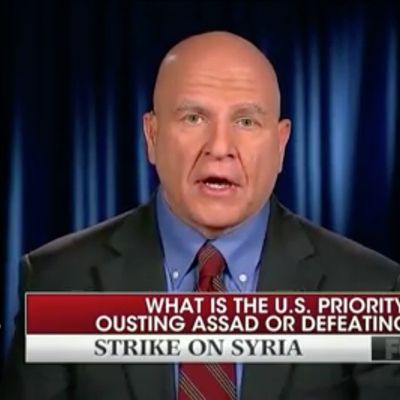
No matter how anyone spins it, the U.S. cruise-missile attack on the Assad regime last week was both an act of war and by far the U.S.’s most direct intervention in the Syrian civil war since it began in 2011. But whether President Trump will use additional military force against the regime, why, and to what end, remains unclear three days after the strike.
Last week, Trump himself cited “flexibility” as his foreign-policy mindset, while others have reported that Trump’s foreign-policy doctrine seems to be to refuse to have a doctrine at all. But assuming there was a Trump administration policy toward Syria a week ago, it has now undoubtedly changed, and Trump administration officials Nikki Haley, H.R. McMaster, and Rex Tillerson were sent out over the weekend to try to explain how — or how not.
Unfortunately, the three officials’ comments diverged as much as they aligned, adhering to an ongoing trend of policy incoherence coming from the White House. Where they did seem to agree, however, was that the U.S. now wanted, or expected, to see Syrian president Bashar al-Assad removed from power, though it was not at all certain how far the Trump administration would be willing to go to ensure that outcome.
U.N. Ambassador Nikki Haley Says Regime Change Is a U.S. Priority
U.N. ambassador Haley indicated on Sunday that, more or less, regime change in Syria is now a priority for the White House following last week’s U.S. airstrike. Appearing on CNN’s State of the Union, Haley was asked by host Jake Tapper if regime change in Syria was “now the official policy” of the Trump administration. She responded in the affirmative, or at least confirmed that removing Assad from power was now among the Trump administration’s priorities, which also include, first and foremost, the defeat of ISIS in the region:
Getting Assad out is not the only priority. So what we’re trying to do is obviously defeat ISIS. Secondly, we don’t see a peaceful Syria with Assad in there. Thirdly, get the Iranian influence out. And then finally move towards a political solution, because at the end of the day this is a complicated situation, there are no easy answers and a political solution is going to have to happen. But we know, that there is not any sort of option where a political solution is going to happen with Assad at the head of the regime.
She then tried to suggest that Assad’s ouster was more of a general inevitability, not necessarily an outcome of U.S.-led action, remarking that, “Regime change is something that we think is going to happen because all of the parties are going to see that Assad is not the leader that needs to be taking place for Syria.”
Less than two weeks ago, Haley told reporters that, in a shift from the goals of the Obama administration:
Our priority is no longer to sit and focus on getting Assad out. Do we think he’s a hindrance? Yes. Are we going to sit there and focus on getting him out? No.
Another White House official later tried to walk back her comment to CNN, saying that she meant removing Assad wasn’t the only goal.
Also on Sunday, Haley attempted to explain why President Trump wasn’t willing to help Syrian children by accepting them into the U.S. as refugees. Asked by Tapper if she thought Syrian children posed a risk to the American people, Haley responded:
Well, Syrian children have to come with Syrian adults. And you don’t know. It’s hard to know based on the vetting process. And that’s unfortunate that we can’t find that out. But hopefully we’ll get to the point that we can.
National Security Adviser H.R. McMaster Says Regime Change Will Be a Group Effort, Unless Trump Changes His Mind Again
Asked on Fox News Sunday to respond to Haley’s regime-change comments, White House national security adviser H.R. McMaster tried to walk her statement back a little:
[W]hat Ambassador Haley pointed out is it’s very difficult to understand how a political solution could result from the continuation of the Assad regime.
Now, we are not saying that we are the ones who are going to affect that change. What we are saying is, other countries have to ask themselves some hard questions. Russia should ask themselves, what are we doing here? Why are we supporting this murderous regime that is committing mass murder of its own population and using the most heinous weapons available?
The former lieutenant general kept trying to reiterate the Trump administration’s commitment to defeating ISIS, and suggested that eliminating the militant group would allow Syria to begin rebuilding itself. Host Chris Wallace kept pressing him on the regime change issue, however, and McMaster made it clear that ousting Assad, somehow, was definitely on the table:
I think as you saw with the strike, that there has to be a degree of simultaneous activity as well as sequencing of the defeat of ISIS first. What you have in Syria is a very destructive cycle of violence perpetuated by ISIS, obviously, but also by this regime and their Iranian and Russian sponsors. And so, what we have to be able to do is to work together with our allies and partners to help resolve this conflict and the resolution of the conflict will tell each of the elements that you are talking about, Chris, the defeat of ISIS, and then also, it has to be a significant change in the nature of the Assad regime and its behavior in particular.
He was then asked whether or not President Trump would use military force to respond to Assad killing his own people with conventional weapons. McMaster’s response was noncommittal, indicating that, after the chemical-weapons strike, he and other advisers provided Trump “with an assessment of what is the degree of agency and control we have over this very complex situation,” and that Trump, “in response to a mass murder attack, acted decisively.” McMaster later added that Trump “will make whatever decision he thinks is in the best interest of the American people, and it will be our job to provide him with options based on how we see this conflict evolve in this period of time before us, after the strike.”
In other words, no, it’s not at all clear if Trump will retaliate against Assad for committing mass murder with conventional weapons, and it will likely depend on the situation and Trump’s characteristically impulsive thinking.
McMaster also commented on Russia’s possible involvement in Tuesday’s chemical-weapons attack, saying that, “I think what we should do is ask Russia — how could it be, if you have advisors at that airfield, that you didn’t know that the Syrian air force was preparing and executing a mass murder attack with chemical weapons?”
Secretary of State Rex Tillerson Says U.S. Will 'Enable' Syrians to Solve Their Own Political Future
Secretary of State Tillerson, appearing on CBS’s Face the Nation, also explained that defeating ISIS was the White House’s top priority, but added that:
Once the ISIS threat has been reduced or eliminated, I think we can turn our attention directly to stabilizing the situation in Syria. We’re hopeful that we can prevent the continuation of the civil war, and that we can bring the parties to the table to begin the process of political discussions.
Tillerson, who last week tried to sell the idea that a U.S. military strike on the Assad regime did not signal a change in U.S. policy toward the conflict, maintained that the Trump administration still wants to “enable” the Syrian people to decide their own political fate, but did not explain how that would actually be possible, considering the overall destabilization of the country, how many Syrians have been killed and targeted by the regime, as well as how many Syrians have fled the country. Instead, Tillerson said that he hoped Syria’s allies, Russia and Iran, would choose to work with the U.S. to come up with a political solution.
Asked about Senator Marco Rubio’s recent comment that saying Syrians should decide their own fate was “nodding to the idea that Assad was going to get to stay in some capacity,” Tillerson responded that, “I think that’s a regrettable comment on the part of Senator Rubio.”
Tillerson also blamed Syria’s continued possession of chemical weapons on Russia, though he acknowledged that there was no evidence that Russia had participated in last week’s deadly sarin-gas attack on the Syrian town of Khan Sheikhoun. Referencing Russia’s 2013 promise to ensure the destruction of Syria’s chemical-weapon stockpiles, Tillerson remarked that, “Russia has failed in that commitment, and the result of their failure has led to the killing of more children and innocents.”






























